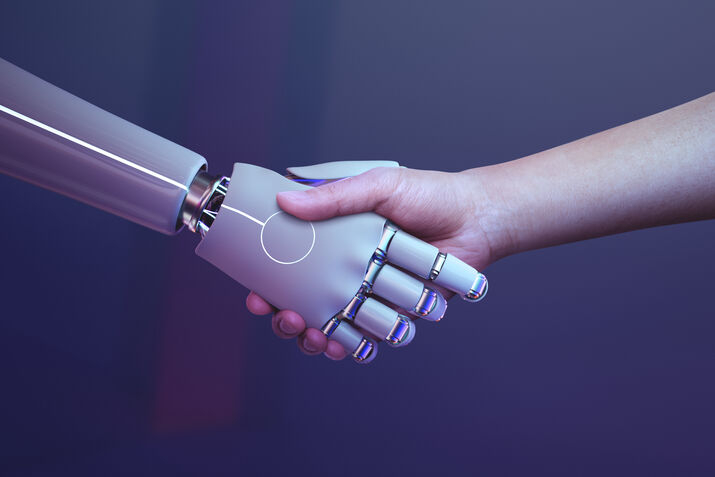Artificial Intelligence has quickly transitioned from being an almost otherworldly concept to becoming a force of change that is reshaping all industries in the United States. From healthcare to finance, and from marketing to manufacturing-Artificial Intelligence is being increasingly used by companies in optimizing processes, improving customer experience, or simply gaining a competitive edge. In this blog, we will dive into what Artificial Intelligence is, how it is used in various industries within the United States, its advantages, obstacles, and what the future holds.
What is Artificial Intelligence?
Artificial Intelligence stands for machines emulating human intelligence through ways of acquiring knowledge, contemplating, and choosing. Such systems carry out the operations on huge amounts of data, recognizing the trends, and delivering results that correspond to the outputs of humans. AI is the amalgamation of techniques such as machine learning, natural language processing, computer vision, and robotics.
For this reason, U. S. organizations are investing in AI solutions to automate repetitive tasks, predict market trends, and enhance their decision-making processes. Adoption of AI as a strategic priority becomes a key trend in almost all sectors, and not only in tech companies.
Applications of AI in the United States
Healthcare
In the United States, healthcare and Artificial Intelligence share arguably one of the most significant applications. AI tools diagnose diseases, predict patient outcomes, and personalize treatment plans. Over and beyond, machine-learning algorithms look at medical images to identify early signs of cancer or other chronic diseases.
At the same time, AI enabled the chatbots to take care of the patient questions in hospitals without any problems, and predictive analytics assisted the hospitals in the best allocation of resources and cost savings. Consequently, the healthcare providers in the U.S.A. got the chance to offer better patient services while making the administrative processes more efficient.
Finance and Banking
Artificial Intelligence brings revolution to the finance industry by improving fraud detection, automated trading, and tailored banking experiences. That is to say, banks in the U. S. utilize AI algorithms that track most unusual transaction patterns to gauge further risk for fraud and financial crimes.
AI-powered robo-advisors will continue to offer real-time investment advice to clients so that they can make better investment decisions. Thus, AI is being used by financial institutions to enhance accuracy, efficiency, and customer satisfaction jointly.
Retail and E-commerce
AI contributes to the retail sector by helping it understand consumer behavior and customize its marketing campaigns, as well as managing a vast amount of stock inventories. For instance, U. S. online companies use AI engines for recommendations, wherein the systems suggest products based on past purchases and browsing history.
AI might further assist by connecting to a chatbot to help customers with their questions, track order delivery, and address issues in a seamless manner that improves the shopping experience. Thus, AI adoption equates to higher sales, lower operational costs, and stronger customer loyalty.
Manufacturing and Industry 4.0
The transition of manufacturing in the U. S. to Industry 4.0 means that Artificial Intelligence has come to play a key role in optimizing production operations; for instance, AI predicts equipment failures and carries out predictive maintenance so as to have the least downtime and maximum efficiency.
With further robotics and AI automation of repetitive tasks in assembly lines in favor of the human lực. Hence, the implementation of AI augments productivity, minimizes errors, and keeps U. S. manufacturers afloat in the competitive landscape globally.
Marketing and Customer Experience
U. S. companies get assistance from AI tools in personalizing their advertisements, predicting what customers will like, and tracking the metrics of engagement. Moreover, AI solutions divide audiences, manage email promotions, and improve content writing to increase the rate of conversions.
AI positively impacts customer service through virtual assistants and chatbots, which provide real-time support, enhance brand loyalty, and ensure a seamless customer experience across multiple channels.

Advantages of AI in U. S. Businesses
- Increase in Efficiency
Increased operational efficiency is one key advantage of adopting AI. With an intelligent system at work, activities that are routine and time-consuming get completed, whereas personnel can work on more strategic and creative tasks.
- Data-Driven Decision Making
Additionally, AI gives businesses in the United States a smarter decision-making process based on data analytics and prediction insights. With AI, by being able to analyze big data, it can identify patterns, forecast demand, and help optimize resource allocation.
Cost Reduction
By automating and optimizing processes, AI empowers businesses to minimize the cost of operations. AI-based supply chain management, for example, lessens the amount of inventory waste, while chatbots cut down on the number of agents required for customer service.
- Competitive Advantage
An AI business is a business considered a competitive entity within the market. It can spur innovation at a greater speed, keep up with customer demands, and beat out competitors that operate on traditional considerations.
Challenges of Implementing Artificial Intelligence
However great the benefits may be, the challenges are to fit and embed AI within U. S. businesses:
- Data Privacy and Security: Try using sensitive data with the utmost respect to compliance; for example, HIPAA, GDPR, etc.
- High Initial Investment: The implementation of AI may be a costly affair-and worse for SMEs.
- Skill Gap: A proficient manpower pool in AI, ML, and data science is lacking.
- Ethical Concerns: Various decisions made by AI systems can pose an ethical dilemma, especially in scenarios that touch upon health, finance, and law enforcement.
However, with meticulous planning and strategic implementation, a business can navigate through all these barriers toward success.
The Future of Artificial Intelligence in the U.S.
The future of Artificial Intelligence in the United States looks very promising. As AI continues advancing, more sophisticated AI applications will be seen in the domains of autonomous vehicles, intelligent robotics, and high-level predictive analytics.
In addition, various government policies and private investment help in promoting AI-related R&D activities. Thus, by 2030, AI is likely to inject trillions of dollars into the U. S. economy by way of innovation and refining the way Americans live and work.
Conclusion
Artificial Intelligence has come to the forefront of reality today, shaping the landscape of businesses in the U. S. To compete, organizations need to leverage AI to become more efficient, drive decision-making through better data, facilitate better customer experiences, and stay ahead.
While challenges exist, the benefits far surpass the risks and imply AI adoption to be a strategic necessity for companies aiming at thriving in this fast business environment. So for US companies, toward completing sustainable development and the long-term continuation of business, the application of Artificial Intelligence is not really an option that exists.



